The Importance of Classic Literature
Research demonstrates that the single activity with the greatest impact on a child’s reading readiness is being read to on a regular basis. Each day, the children at Stepping Stone School listen to read-alouds, observe environmental print, delve into the classroom library, interact with our classic children’s literature collection and explore other books and printed material. These activities benefit children of all ages and support numerous pre-reading skills.
Daily Reading
As Stepping Stone School, teachers read to the children in their classrooms and employ a number of strategies and activities that teach necessary preparedness skills:
- Before reading a book, teachers will talk about the parts of the book like the cover and the title page. Teachers will also discuss the roles of the author and the illustrator and then demonstrate the directions we move when reading (left to right and top to bottom). These kinds of activities provide children with the important concepts of print.
- As our teachers read, they will pause to ask the children how the characters are feeling or what the children think will happen next which invites the children to interact with the story and connect with the characters.
- After reading a book, the teachers ask children to re-tell the story to check for understanding, they will also have children tell about their favorite or least favorite part of the story. These interactivities are proven to support reading comprehension because they encourage children to think about and interact with the information they just heard.
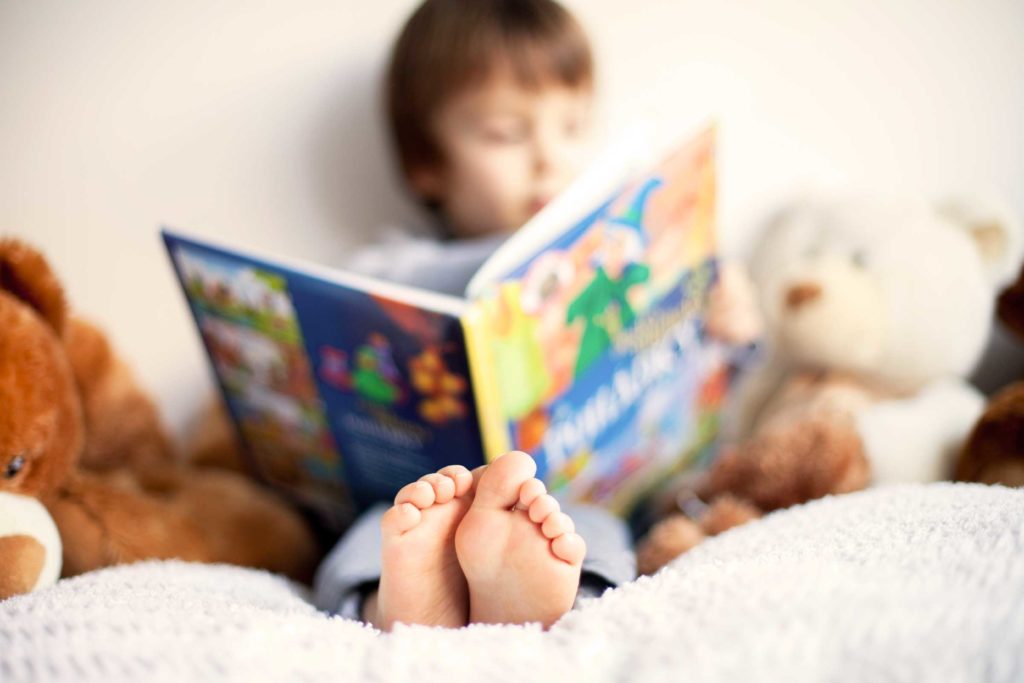
Classroom Library
Each classroom at Stepping Stone School is equipped with a classroom library full of age-appropriate books and materials.
- Our classroom libraries include books the children have helped to create or books relating to the theme the children are studying.
- Books like these are beneficial because they hold the child’s interest and get them excited about reading.
- If you look closely in our classroom libraries, you will also find puppets for children to use. Children are encouraged to “read” stories to the puppets while employing various reading strategies such as looking at the pictures and telling the puppet about what is happening.
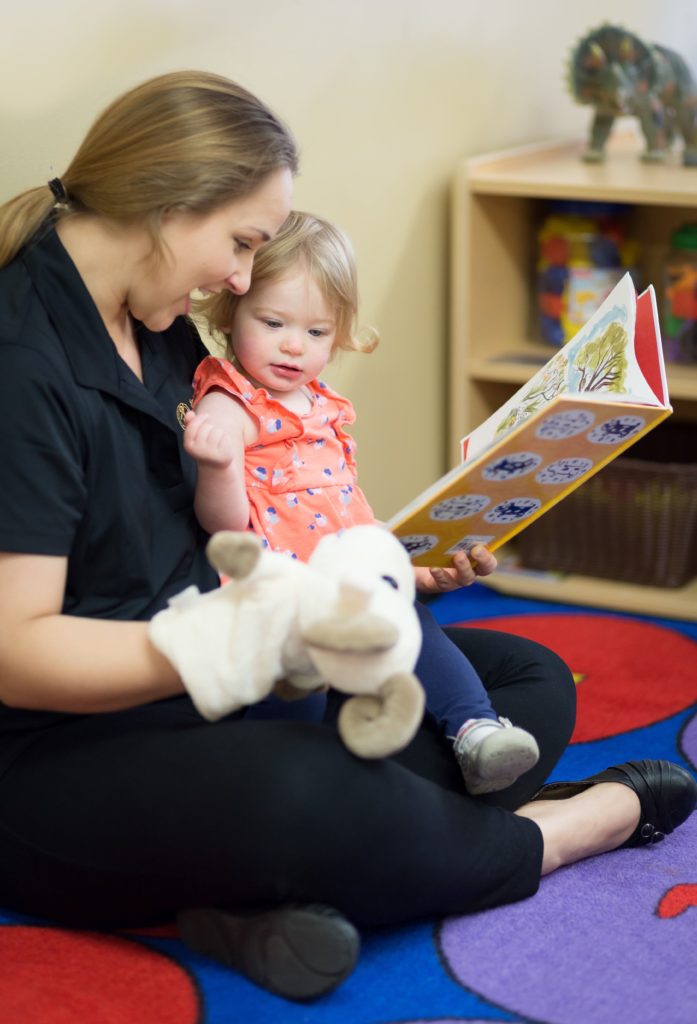
Teacher Resource Library
Every Stepping Stone School has an abundant library of classic literature and teacher resources to teach, inspire, and engage children as they develop every day.
- Our extensive library assists with character development as well as proactive prevention of many early childhood difficulties.
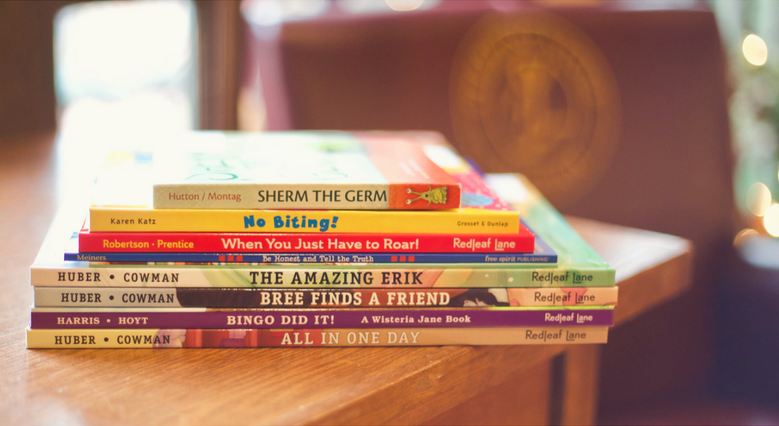
Classic Children’s Literature Collection
Beautifully written and illustrated books like Good Night, Moon by Margret Wise Brown, Where the Wild Things Are by Maurice Sendak, and Blueberries for Sal by Robert McCloskey are a few examples of the literature that has captured the hearts of generation after generation and is now being read to even the youngest children at our schools.
- Classic children’s literature is of important significance as it fosters personality and social development.
- Development during the formative years is rapid and children’s literature can help our students develop into compassionate, bright and kind people.
- According to Piaget, when students move from the pre-operational to the operational stage of cognitive development, they become less egocentric. Meaning students in preschool and kindergarten may be predominantly focused on themselves, but as children develop they begin to take into consideration the feelings and viewpoints of others.
- Being able to understand other people’s viewpoints is an important skill which adults must nurture in children.
- Children’s literature can promote social development by encouraging students to accept other people.
- Research clearly supports reading classic literature can improve a child’s vocabulary along with their writing and speaking ability.
- At Stepping Stone School, our teachers read at least one classic children’s literature book daily to expose the children to the books that have stood the test of time.
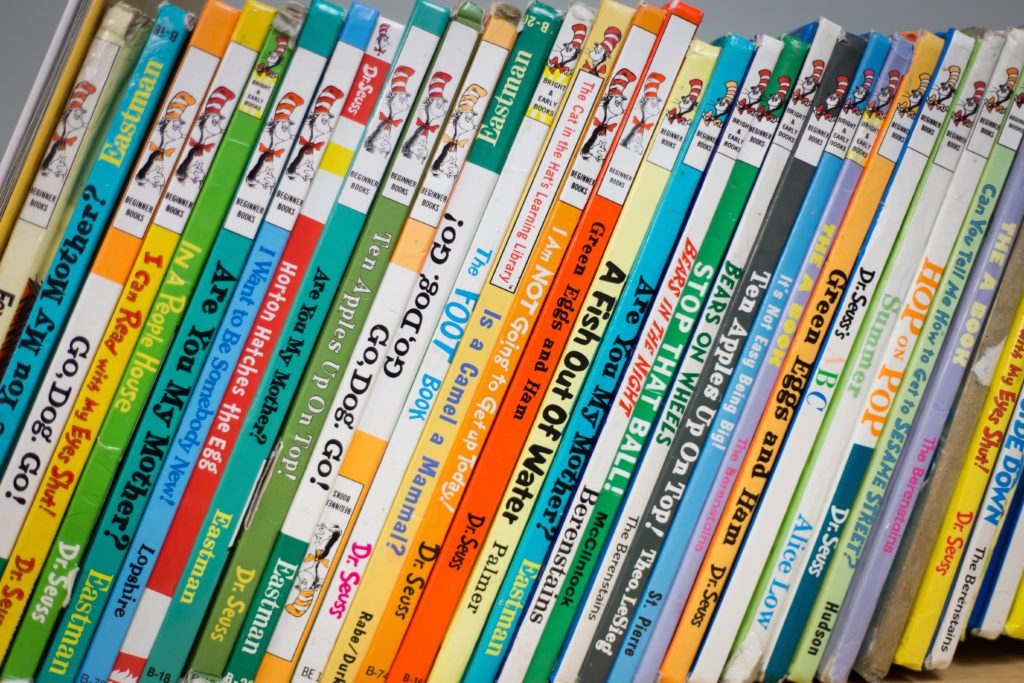
Books and Printed Material
At Stepping Stone School, written print and books can be found throughout the classroom and are used continuously throughout the day.
- Our goal is to make our classrooms rich with print in order to encourage reading at every level.
- Children who are exposed to printed materials are more likely to attempt to interact with it and even attempt to read it at a very early age.
Environmental Print
Environmental print includes printed material that is commonly found throughout the community.
- Some examples include: signs, logos, menus, and advertisements.
- At Stepping Stone School, we use environmental print in our dramatic play and block centers to support interaction with print through child-directed play.
- The benefit of using environmental print is that even very young children are able to make associations between a symbol (ie. The golden arches of McDonald’s) and a meaning (ie. Happy meals and playgrounds).
- Making these associations are foundational to reading, therefore, we promote the use of environmental print in our classrooms on a regular basis.
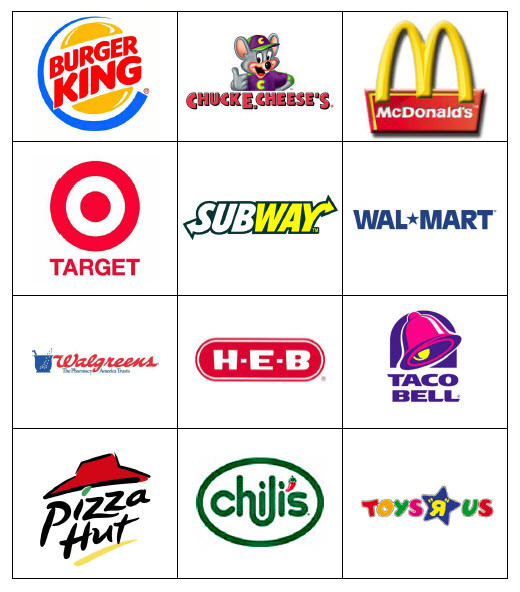
By incorporating opportunities for hearing stories on a daily basis, observing printed material, and interacting with it, the children at Stepping Stone School are prepared to embark on a journey of reading readiness which begins in our infant classrooms and continues to develop over the next several years as we prepare our children for Kindergarten.
Books to Read with Your Children
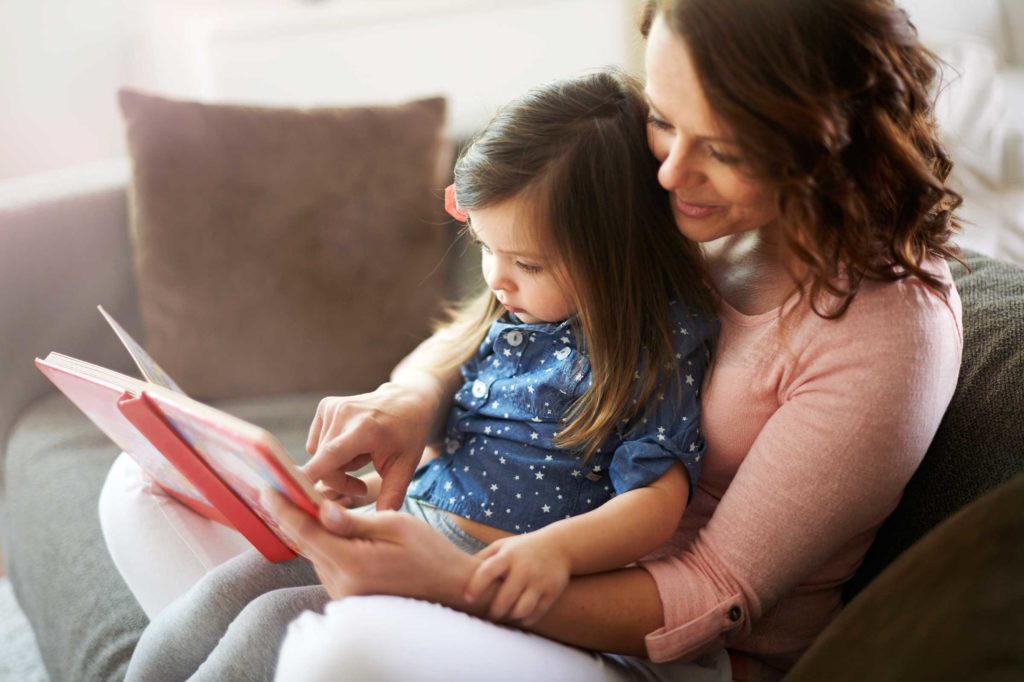
One of the ways to raise a reader is to read with your child often. We recommend:
Stepping Stone School Classic Children’s Literature
- Alexander and the Terrible, Horrible, No Good, Very Bad Day by Judith Viorst
- Are You My Mother? by P.D. Eastman
- Blueberries for Sal by Robert McCloskey
- Brown Bear, Brown Bear, What Do You See? by Eric Carle
- Caps for Sale by Esphyr Slobodkina
- Chicka Chicka Boom Boom, by Bill Martin, Jr. and John Archambault
- Corduroy by Don Freeman
- The Complete Adventures of Curious George by H.A. and Margret Rey
- Freight Train by Donald Crews
- The Gingerbread Boy by Paul Galdone
- Goodnight Moon by Margaret Wise Brown
- Harry the Dirty Dog by Gene Zion
- Make Way for Ducklings by Robert McCloskey
- Mike Mulligan and his Steam Shovel by Virginia Lee Burton
- The Snowy Day by Ezra Jack Keats
- Stone Soup by Marcia Brown
- Ten, Nine, Eight, by Molly Bang
- Tikki Tikki Tembo by Arlene Mosel
- The Very Hungry Caterpillar by Eric Carle
- Where the Wild Things Are by Maurice Sendak
- You Give a Mouse a Cookie, by Laura Numeroff
Additional Suggestions for Infants:
- Baby Faces, by DK Books
- Belly Button Book! by Sandra Boynton
- Big Red Barn, by Margaret Wise Brown
- Everywhere Babies, by Susan Myers
- Go, Dog, Go! P.D. Eastman’s Book of Things That Go, by P.D. Eastman
- Good Night, Gorilla, by Peggy Rathmann
- Mr. Brown Can MOO! Can You? Dr. Seuss’s Book of Wonderful Noises, by Dr. Seuss
- Mrs. Mustard’s Baby Faces, by Jane Wattenberg
- Pat the Bunny, by Edith Kunhardt Davis
- Sounds on the Farm, by Gail Donovan
- Ten Tiny Babies, by Karen Katz
- Toes, Ears, & Nose! by Marion Dane Bauer, illustrated by Karen Katz
- White on Black, by Tana Hoban
Additional Suggestions for Toddlers:
- Baby HAPPY, Baby SAD, by Leslie Patricelli
- Bear Snores On, by Karma Wilson
- Counting Kisses, by Karen Katz
- Fast Food, by Saxton Freymann
- Napping House, by Audrey Wood and Don Wood
- Sheep in a Jeep, by Nancy E. Shaw and Margot Apple
- The Happy Egg, by Ruth Krauss
- This Is Not My Hat, by Jon Klassen
- We’re Going on a Bear Hunt, by Michael Rosen and Helen Oxenbury
- Where’s My Teddy? by Jez Alborough
- Yummy Yucky, by Leslie Patricelli
Additional Suggestions for Preschoolers:
- Beautiful Oops, by Barney Saltzberg
- Cars and Trucks and Things That Go, by Richard Scarry
- Charlie and Lola’s Opposites, by Lauren Child
- Chickens to the Rescue, by John Himmelman
- George and Martha, by James Marshall
- Happy Birthday, Moon, by Frank Asch
- Harold and the Purple Crayon, by Crockett Johnson
- I Stink! by Kate and Jim McMullan
- Jamberry, by Bruce Degen
- Knuffle Bunny: A Cautionary Tale, by Mo Willems
- Little Bear, by Else Holmelund Minarik
- The Incredible Book Eating Boy, by Oliver Jeffers
- The Little Engine That Could, by Watty Piper
- The Neighborhood Mother Goose, by Nina Crews
Additional Suggestions for School Age (K-3)
- Charlotte’s Web, by E. B. White
- Chocolatina, by Erik Kraft
- Cloudy with a Chance of Meatballs, by Judi Barrett
- Elizabeti’s Doll, by Stephani Stuve-Bodeen
- Fireman Small, by Wong Herbert Yee
- Harriet the Spy, by Louise Fitzhugh
- Mr. Grumpy’s Outing, by John Burningham
- Nate the Great, by Marjorie Weinman Sharmat
- Olivia, by Ian Falconer
- Sylvester and the Magic Pebble, by William Steig
- Tea with Milk, by Allen Say
- Thank You, Amelia Bedelia, by Peggy Parish
- The Giving Tree, by Shel Silverstein
- The Indian in the Cupboard, by Lynne Reid Banks
- The One and Only Ivan, by Katherine Applegate
- The Velveteen Rabbit, by Margery Williams
Additional Suggestions for Tweens (8-12 yrs)
- A Wrinkle in Time, by Madeleine L’Engle
- Anna Hibiscus, by Atinuke
- Black Beauty, by Anna Sewell
- Bridge to Terabithia, by Katherine Paterson
- Hatchet, by Gary Paulsen
- Maniac Magee, by Jerry Spinelli
- Matilda, by Roald Dahl
- Secrets Letters from 0 to 10, by Susie Hoch Morgenstern
- Shipwrecked, by Rhoda Blumberg
- Sideways Stories from Wayside School, by Louis Sachar
- Tales of a Fourth Grade Nothing, by Judy Blume
- The Bad Beginning (A Series of Unfortunate Events, Book 1), by Lemony Snicket
- The Lion, the Witch, and the Wardrobe, by C.S. Lewis
- The Phantom Tollbooth, by Norton Juster
- The Plant That Ate Dirty Socks, by Nancy McArthur
- The Time Warp Trio: Summer Reading Is Killing Me! by Jon Scieszka
- The Watsons Go to Birmingham, by Paul Curtis